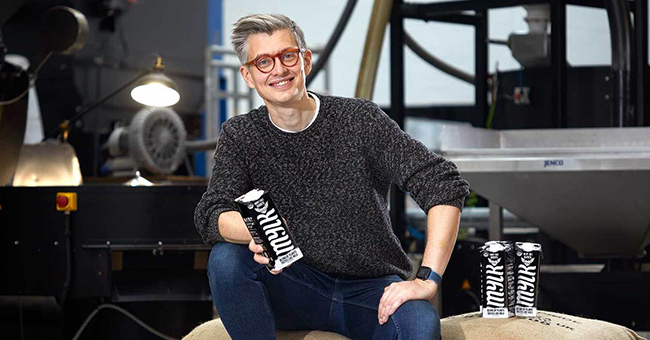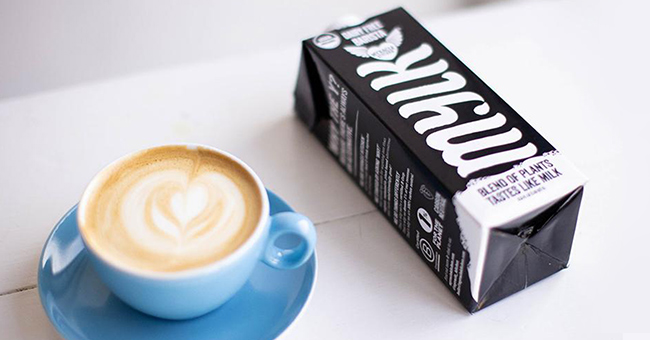British holding company Nurture Brands is launching a unique Barista Mylk, developed in partnership with coffee expert James Hoffman, as the first entry for its North American plant-based milk brand, Myracle Kitchen.
What is Myracle Kitchen?
If Myracle Kitchen’s logo looks familiar, there’s a reason for that: London-based Nurture Brands, which also owns plant-based milk maker Rebel Kitchen in the U.K., is the parent company behind the brand, which is positioned as its entry point to the rapidly growing plant-based milk category in the U.S. and Canada. The company previously launched a premium coconut water in the States in 2016, which has since been discontinued. Myracle Kitchen Barista Mylk, as well as its forthcoming “everyday” Low Fat and Whole varieties, are marketed under the Rebel Kitchen banner in Europe.
Nurture’s other CPG interests include snack brands EMILY and Ape Snacks, as well as protein bar maker The Primal Pantry.
The companies in Nurture Brands’ portfolio share a commitment to environmental sustainability and ethical business practices: each is a certified B Corporation and donates 1% of revenue to support regenerative organic agriculture through nonprofit group 1% For the Planet.
What is the product?
Myracle Kitchen’s initial U.S. release is its certified organic Barista Mylk, available in 32 oz. shelf-stable TetraPak cartons for a suggested retail price of $4.49. The line contains no gums, thickeners, stabilizers, artificial ingredients, cane sugar, soy or carrageenan. The product contains 140 calories and 8 grams of added sugar per 8 oz. serving.
Barista Mylk will be launching at juice bar and coffee house chain Joe & the Juice, as well as with specialty food and beverage distributors CLW in New York and Shoreline Supply Company in California. The product is also available to order directly from Myracle-kitchen.com and on Amazon. Retail placements have yet to be announced; the company is currently working with The National Sales Group to open that market, Arbib said.

Why Barista Mylk?
Before oat milk became a household staple, it was first embraced by coffee enthusiasts at specialty cafes across the country. Myracle Kitchen is hoping that entering into the market with a differentiated and disruptive take on a barista-focused product will help lay the groundwork for its further expansion into retail later this year.
“Our take was that most new consumers discover plant-based milks through coffee shops,” said Ben Arbib, founder of Nurture Kitchen. “A lot of the stuff that was behind the counter wasn’t ultimately doing what the consumer was after.”
To Arbib, what consumers want is a product that replicates dairy milk as closely as possible, both in texture and taste. That means a non-dairy milk that foams and pours similarly to a dairy milk, but which retains a neutral flavor profile: in Arbib’s words, it goes back to “getting away from being the taste of the ingredient in question.”
To strengthen its coffee credentials, the team at Myracle Kitchen enlisted former World Barista Champion and industry consultant James Hoffman to help develop the product. Over 18 months and 140-plus iterations, the group settled on a formulation that contains oat milk, coconut cream and faba bean protein. If the idea is to highlight the coffee, the thinking goes, then other notes — such as oat, almond or whatever the source — should be as neutral as possible.
“We know from consumer research that a lot of consumers don’t like putting plant-based milks into coffee because it does change the taste, so they see that as a barrier to entry,” said Graeme Puffett, General Manager, USA for Nurture Brands. “We are offering something that means they can taste the flavor and the aroma of the coffee. There’s a big market for consumers who at the moment aren’t willing to compromise (on taste) to move into plant-based milks.”
As stated, coffee has been one of the major catalysts for the explosion of plant-based milks, which grew by 20% to $2.5 billion in sales last year. However, some of the category’s biggest players have already made their moves: Oatly has a nationwide partnership to supply all Starbucks locations, while Chobani teamed with La Colombe last year to place its Oat Barista Edition non-dairy milks at its cafes. Outside of coffee houses, household penetration for plant-based milk surpassed 40% in 2020, according to data from The Good Food Institute.
What comes next?
Myracle Kitchen is set to follow the release of Barista Mylk by releasing Low Fat (3.5 grams per 8 oz. serving) and Whole (5 grams per 8 oz. serving) versions of its plant-based milk later in Q4. Using the tagline of “Blend of Plants, Taste Like Milk,” both products will also be sold in 32 oz. shelf-stable cartons. Ingredients include gluten-free oats, cashews, coconut cream and hemp protein. A snack product will also be introduced under the Myracle Kitchen brand at that time.
By early 2021, the company, based in New York, expects to have U.S. manufacturing operations up and running.
